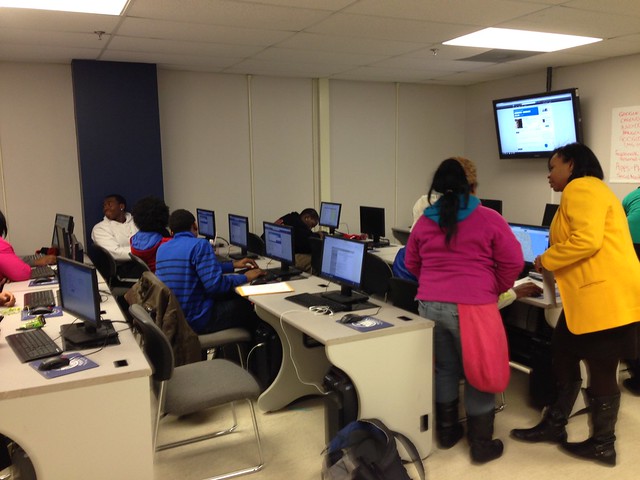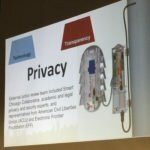As we continuing our work with the Chicago School of Data, we wanted to publish another one of our interviews to give people a sense of the information we’re getting. Here’s a partial transcript from our interview with the Chatham Business Association.

For this interview, we talked with Samia Malik who manages four Chief IT Ambassadors, and 8 IT Ambassadors. The Chatham Business Association then trains to become trainers for the small businesses in the area.
What does your organization do? "We're a small business development center. We support all the small businesses, whether it's financial, marketing, networking, technology--anything related to developing the small businesses in the community."
The Chatham Business Association started out with just helping the Chatham neighborhood, but now the organization helps businesses all over Chicago. We asked them what kind of data they collect when they talk with organizations.
"We do a lot of contact information collection. We want to communicate through e-mail, so e-mail, phone, business address, business names...We also want to get an idea of where they are technology-wise, so we do a tech assessment where we find out how often they are checking their e-mails, if they have Internet access, what company they use for their Internet. And every program we have we basically go out and get an assessment of our businesses in the area, and that's more Chatham based--the surveys that we take. We asked about our facade enhancement program where we went out to see how many people are interested in that and we asked about the security. We have a patrol that goes out so we do an assessment to see what time of day people would prefer additional security... Microlending we went out and did an assessment to see how many businesses have gone for a small loan before, if they've gone through the Accion Program, to kinda see where they've been at and if they're aware of the programs we have to offer."
One of the big things that they do is a microlending. Through their partnership with the Small Business Administration, they can give $25,000 to non-traditional small business owners such as women, veterans and businesses located within LMI and other specially designated areas.
You collect technology information from your members, obviously financial--if they go after loans, things like that. Is there any other financial data that you collect from them? Maybe like their total sales? "We try to, but it's a little bit harder because a lot of them are cash-based, but that is part of the financial training--trying to get them to use other software where they can let us know what they spend monthly, yearly. They are not there. We are trying to move to get to there. So, a lot of times all the forms that they need to fill out--whether it's for grants or loans--you do need to know that information beforehand, and that's kinda where we come in. We can sit down with them and let them know what they need to gather and how to best gather that information and submit it properly, cause they don't have a clue sometimes."
We also wanted to get a better sense on what tools they used to collect and analyze information.
Have you done some research on different tools that they can use to keep track of their finances, so they can report them? "We have not really. We're trying to get Excel training and Quickbooks training, but we don't--actually, I don't know exactly how it works, because through the loan microlending program they do have consultants that they go through and I think that they do recommend the next steps, I just never went through it myself. I'm pretty sure that's what they're there for though." So the data that you collect through surveys and things like that, where do you store it? How do you store it? "It's usually Google Docs or Google Drive--the forms, we use Google forms." So you're using Google forms. You're not using Excel? "We used to, but then we moved on." How do you typically analyze your internal data? "Google does their reports...we use Chamber Master as well, but not to its full capacity, I don't think we use that as much to analyze the data...Depending on if we're using it for a grant or depending on what we're using that information for, we kinda go back into our data and reconfigure, find the right data and create our graphs, which is usually through Excel graphs or Powerpoint or the Google reports."
Chamber Master is member management software that’s software as a service. (Meaning that you pay by the month.) It helps organizations keep track of data on their members and generate custom reports. However, the system isn’t perfect.
So when you are going through those reports and pulling data out, is it challenging to do that? "Yes. I think everyone likes their own means of collecting data and analyzing it. A lot of times we just select it and don't have time to analyze it, but...I like doing the analyzing part and creating reports, but it's about having time and actually sitting--there's like multiple layers of data that somehow I know could come together, we just haven't had the right person or the right tool to kinda make it come together I guess. I'm not sure what we're missing, but there's something we're missing which would kind of help us out." It's difficult, it's challenging. You're dealing with large pieces of data. You kinda know what you want or what you're trying to accomplish, but it's hard to figure out how to do that. "Yeah, cause there's so many different programs. There's businesses that have dealt with all, several, or maybe 5 or 6 programs, and it'd be nice if we could just pull up the business and see everything that we've worked on with them previously. Kinda like the doctor sheets that can tell you your past history...we're getting a little bit better at it, but we don't have it like that yet."
Not only does the Chatham Business Association need to collect information from the organization it contacts, it also needs to draw data from other areas as well.
It's important if you're an organization that supports local businesses, and that'd be great information for the businesses themselves to see, how much is being spent in their area. You mentioned a couple places you go and get data. Do you find it challenging to go to those places and pull the data that you need? "Oh yeah. It's always like you go to multiple sites and then only extract what you're looking for and then fit it into what you're trying to report on. And usually when we look for data it's usually for presenting to another organization or applying for a grant, y'know, you want those numbers, cause I think that's what gets you the results, so if you can provide the appropriate data and the numbers to match up with what your goals are and where your programs are trying to go, then I think that helps. But yeah, I don't think we use it to the fullest amount, we barely scratch the surface when we are collecting the data."
To find out more about these issues and more, register for our Chicago School of Data event on September 19th through the 20th!






